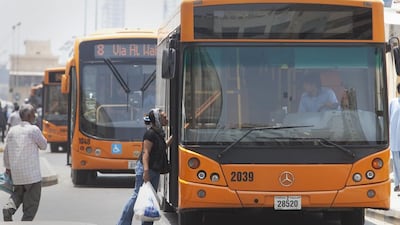SHARJAH // Plans to reduce traffic congestion by encouraging people to leave their cars at home and use public transport are being drawn up by the municipality.
As part of the emirate’s transport masterplan, a field survey is being carried out until the end of November to gauge residents’ opinions on timings, routes and their preferred modes of transport.
“Gathering this data will contribute to develop the transportation system in Sharjah based on questionnaire results that shows inhabitants’ actual requirements,” said Sheikh Khalid bin Saqr Al Qassimi, Chairman of the Directorate of Public Works (DPW).
“During the first stage of the study, a team of surveyors will distribute questionnaires for the public that will elicit preferences of transportation options, the peak timings of vehicle use, origin, destinations and preferred routes and other models of transportation,” Sheikh Khalid said.
The survey is the first phase of the Sharjah Comprehensive Transportation Plan, announced in June under the slogan “Together for Integrated Sustainable Transportation”, being undertaken by the DPW and Sharjah Transport Corporation (STC).
“At present there is no up-to-date strategic transport model for Sharjah and while some transport data sets are recent and extensive, there are a number of areas where new data is essential,” said Abdullah Al Zari, director general of the STC.
Sheikh Khalid said the plan would help reduce the use of private vehicles, enhance public transport and cut environmental pollution.
“The main objective of the plan is to set a comprehensive traffic conception of Sharjah for the two coming decades so that Sharjah will be a world-class destination in this regard,” Sheikh Khalid said.
“The plan is a practical step that aims at finding out effective, short-term solutions for current traffic congestions.
“It will also consider evaluating existing road networks and public transport systems, in addition to setting a long-term strategic plan that will consider economic and population growth of Sharjah and to accommodate the expected increase of traffic movement.”
Engineer Muhsin Balwan, manager of the traffic engineering department at the DPW, said feedback from the survey would provide insight into people’s travel patterns and behaviour, with information about time of travel, origin and destination, purpose, frequency of travel, types and number of vehicles used and traffic movement across borders.
“There will be a combination of different surveys, like household, roadside, main public and private car parks, workplaces and shopping malls, bus stations and on-board interviews to collect the data required for the plan,” Mr Balwan said.
A delegation from the DPW and the STC has visited the UK and South Korea to learn about best practices and solutions to develop a transport system that satisfies public demand.
ykakande@thenational.ae

